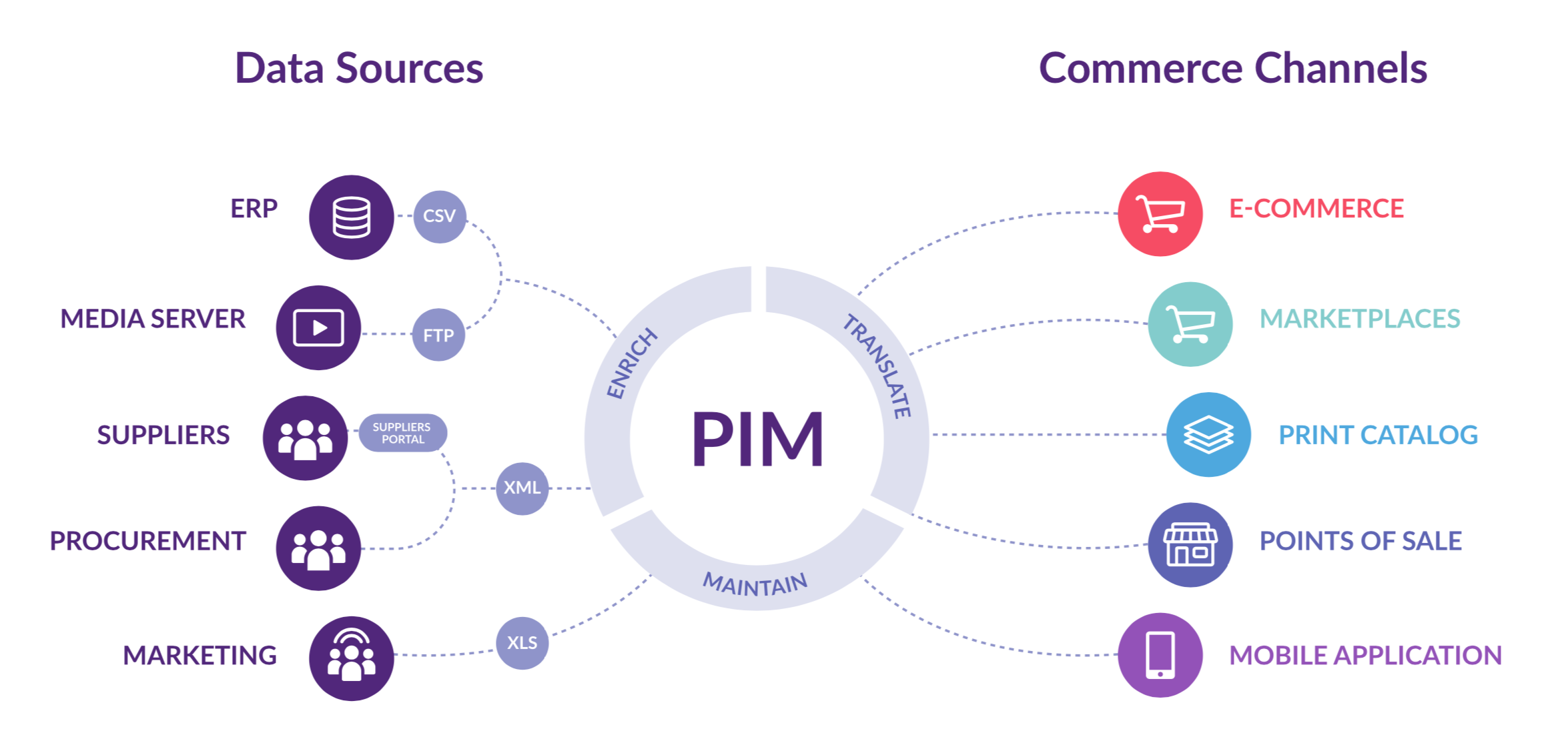
The nature of e-commerce businesses often necessitates the use of a centralized database that can store and manage product information.
A PIM system can be used to efficiently manage and organize product data across multiple channels, even when the same product appears in different varieties, like sizes or colors. PIMs can simplify product-related processes and streamline your operations, ultimately making your organization run smoother and more efficiently.
Many eCommerce app development services offer custom-made PIMs for e-commerce businesses looking to optimize their management processes. Want to know if implementing one would be a good idea for your store? Keep reading to learn more from the experts.
Table of Contents
What is a PIM?

Source: factory.dev
Product Information Management (PIM) is a system that enables users to store, view, manage, and edit product-related data.
It simplifies data import and export from sources, ensuring consistency and accuracy across all of your sales channels. By centralizing product information, PIMs help to improve both the workflow and customer experience, so they are extremely useful for all e-commerce businesses looking to improve their processes.
Keeping track of product details, specifications, pricing, and inventory in one location is useful not only for the sales team but also for the marketing and customer service departments.
Such centralized approach ensures that all your teams have access to accurate and up-to-date data, leading to better cross-department communication and improved results.
How to Get the Best PIM?
The easiest way to obtain access to a Product Information Management system would be to just reach out to software providers or IT consulting services and ask for a demo or consultation. While many options are available on the market, it’s important to carefully evaluate each solution to ensure you get something suitable for the size and type of your business.
A custom-made system would be an investment, but it can better address the issues your organization might face.
Additionally, such tailored solutions usually turn out to be a better option in the long run. Therefore, it is worth considering if your business has specific needs that may not be met by off-the-shelf solutions.
Benefits of Using Product Information Management Systems
There are many advantages to using PIMs, and which ones are the most important will depend on your personal needs and preferences. However, there are several universal factors that make PIMs a valuable tool for businesses of all sizes.
Time and Cost Savings

Source: kochiesbusinessbuilders.com.au
Product Information Management systems largely improve the efficiency of managing and updating product data, which can save businesses time and money in the long run.
This is especially important for companies with large product catalogs or frequent updates, as manual data entry and maintenance can be time-consuming, and human error can cause costly mistakes.
Data Consistency
When the Product Information Management system is integrated with other solutions you use, it ensures that all data across different platforms remains consistent and up-to-date.
This helps to avoid discrepancies and costly errors, as well as improves overall data accuracy and reliability for better decision-making.
Ensuring the consistency of your product details is an absolute necessity in a niche as competitive as e-commerce, so being able to have all your data standardized and synchronized through a PIM system can give you a competitive edge.
Improved SEO

Source: goaland.com
A better product database with correct titles, descriptions, and metadata means the search engines will better understand your content.
Implementing effective marketing tips for your e-commerce business alongside SEO-friendly product data is crucial if you want your online store to be noticeable in the oversaturated online marketplace and attract potential customers who will look for products via search engines.
This can, in turn, lead to higher rankings in search results, boosting your web visibility and even driving more traffic to your website.
Better Customer Experience
A unified system for managing product information ensures consistency across all channels, providing all customers with correct and up-to-date data about your products.
This ensures they know what the product is and is not, reducing confusion and return rates. Furthermore, accurate product information can foster customer trust, which will boost repeat business and loyalty.
Faster Time-to-Market

Source: information-age.com
If you want to launch your new products as soon as possible, a Product Information Management system can help streamline the process by centralizing all product data and making it easily accessible to all relevant teams.
Having one centralized source of product information may significantly reduce the time it takes to get new products to market, allowing you to introduce new merchandise sooner than usual.
Easier Integration
Your PIM tool can be integrated with other systems that you use, such as your ERP system or e-commerce platform, ensuring seamless data flow and consistency across all platforms.
Such integration can lead to improved efficiency and accuracy in managing product information, ultimately resulting in a more streamlined and cohesive workflow.
Such a unified approach can also reduce costs, so you can allocate resources differently.
Are PIMs Popular for Online Stores?
To properly reply to this question, it would be helpful to take a look at the statistics: the size of the world market for product information management is expected to grow to $59.25 billion by 2027. The numbers are truly impressive, and they definitely tell us that such software is indeed popular.
Using a PIM in eCommerce settings is a strategic decision that can significantly impact the chance of success, and every year, more and more business owners decide to implement these systems in their stores. Should you be next?
Do You Really Need a PIM in Your Business?

Source: microstartups.org
While PIMs are not necessary to run an e-commerce business, they make managing product data much easier.
Increased efficiency, accuracy, and consistency in product information management are benefits that cannot be overlooked. Additionally, a PIM can also help improve customer experience by ensuring that accurate and up-to-date product information is readily available to consumers.
If you are worried that your current product data management process is slowing down your time to market or causing inconsistencies in your product information, investing in a PIM may be a wise idea.
The investment can ultimately lead to increased sales and more efficient operations, in turn improving your business performance and competitiveness in the market.







